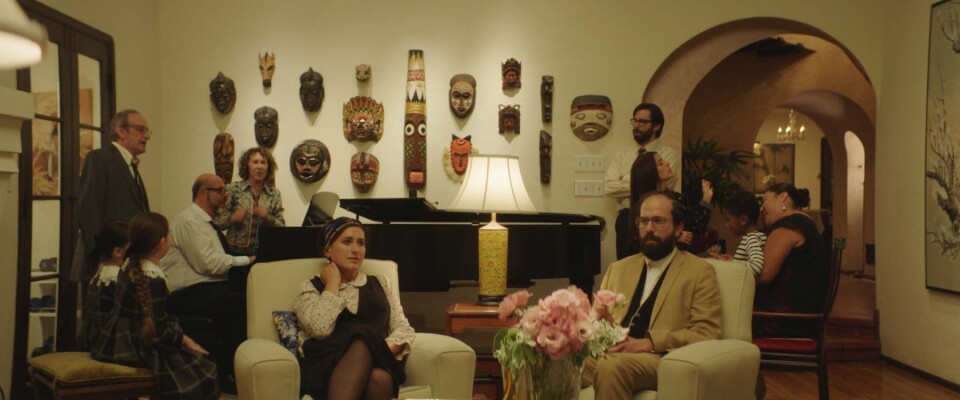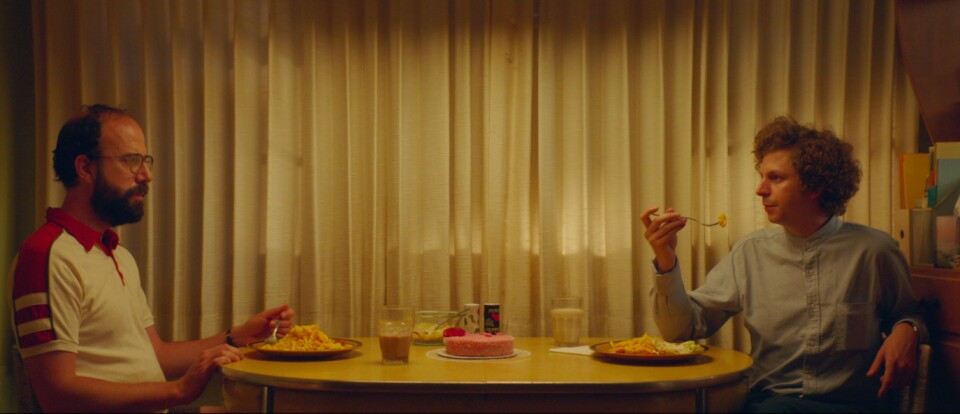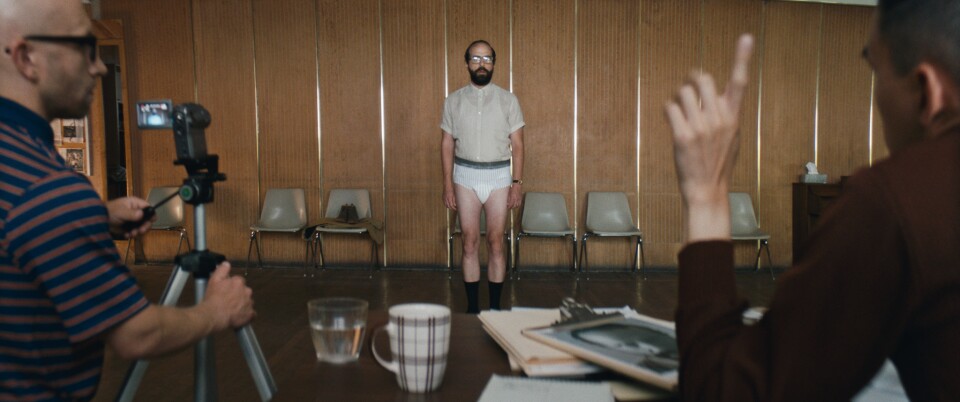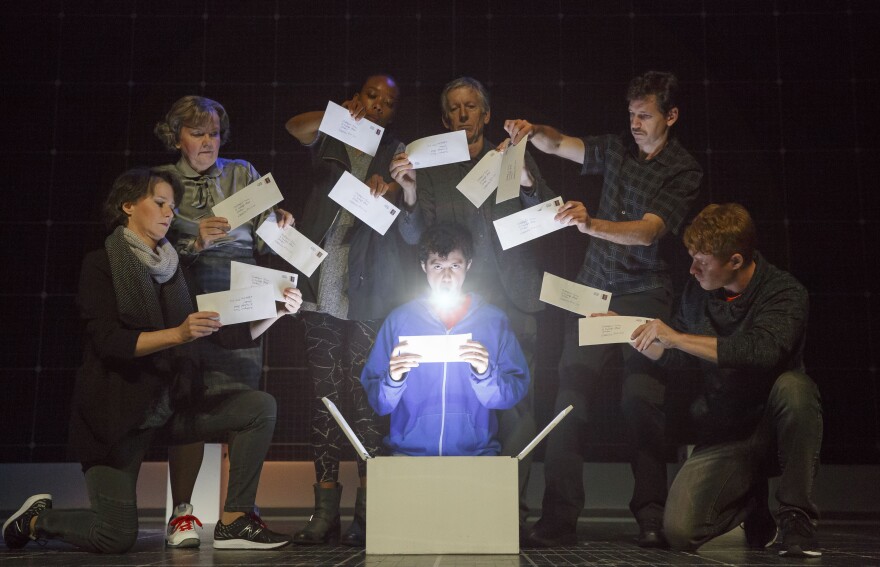Apple plans to spend $1 billion towards on making and acquiring original content in a bid to rival Netflix, Hulu and Amazon. "Lemon" filmmakers Janicza Bravo and Brett Gelman channel their own anxieties into their uncomfortable comedy. And Adam Langdon plays a character with an unspecified disorder in the stage adaptation of the book, "The Curious Incident of the Dog in the Night-Time."
'Curious Incident' actor Adam Langdon on playing a character with a brilliant mind and a difficulty connecting
“The Curious Incident of the Dog in the Night-Time” is playwright Simon Stephens' adaptation of the best-selling novel of the same name by Mark Haddon.
Adam Langdon stars as 15-year-old Christopher Boone in the Tony Award-winning play's first U.S. tour at the Ahmanson Theatre through Sept. 10 and at the Segerstrom Center for the Arts from Sept. 12-17.
Boone is incredibly intelligent. But because of his difficulty interpreting and conveying emotion, he has a hard time navigating everyday life. When he's suspected of killing his neighbor's dog, he decides to solve the case on his own, setting in motion a journey that leads to a life-changing discovery.
Langdon recently spoke with The Frame's John Horn about the play and the complicated task of playing a character with an un-named disorder that many would interpret as autism.
Interview highlights:
On playing a character who cannot articulate his emotions, and whether there were certain things he knew he could or could not do in his portrayal of Christopher:
I don't think we ever talked about what he could not do. The word no was very rarely said, which is always really helpful. There were some stylistic things that I implemented for a lot of rehearsal that I was then told to take away. But I found that once they'd been away, the emotion that was brought with them was still there.
On connecting with Christopher's character:
One of the things I really wanted to bring to the part was that Christopher is a teenager, and we've all been there. We've all been at that point where dad has said something and we just roll our eyes because it is so stupid. And Christopher goes through that a lot because he thinks most people are a lot dimmer than he is. So that was one of the ways for me to bring myself into Christopher, to be a teenager, to be annoyed by Dad, to be confused by [his teacher] Siobhan, to be weirded out by whatever Mom is saying to him at that time. And it fed into my Christopher well. It was lucky that that choice ended up working because that was kind of my 'in' on him, really.
On what it's like to play a character with an unspecified disorder:
It's never mentioned in the play, it's never mentioned in the book. But he has hangups. He's got things he doesn't like: certain colors, sounds, being touched. These are things that are big no-nos for him. And to navigate that world, it's a complex thing. He has to have a schedule, he has to know when everything is going on. And if something screws with his schedule, that can kind of destroy his world for a second ... I think the main thing is to try not to [mimic] something you've seen or heard or read about, and really focus in on the fact that he is a human. Like all of us, he's had disappointments, he's had joy, he's had sadness. He has trouble conveying all these things, but that doesn't mean he doesn't have them. I think it all connects to being a teenager. It's one of the most complicated parts of life and to navigate it with all this extra stuff, you know, he's a champ.
On the interactive set and physicality of the play:
The audience and the set are the unspoken characters of the piece. And me and this set have to work together in a lot of different ways ... Every morning in rehearsal we'd do an hour-and-a-half of boot camp and that sweating together really brought us together. Then we'd do three hours of movement stuff. It was rough but, again, not saying no — saying yes. Christopher requires bravery from everyone in the play because he finds bravery within himself. There's this sequence called 'Astro Boy.' He's talking about wanting to be an astronaut and I'm kneeling on two people's shoulders and I'm not hanging onto anyone and it's scary. Because I know I have to fall backwards and hope that people catch me. And that's just one part of a bigger segment. And it sounds silly ... but I was just like, Christopher needs you to be brave so just do it. It's your job.
"The Curious Incident of the Dog in the Night-Time" is at the Ahmanson Theatre through Sept. 10 and at the Segerstrom Center for the Arts from Sept. 12-17.
With 'Lemon,' Brett Gelman & Janicza Bravo make art out of anxiety
This interview originally aired in January 2017 leading up to the Sundance Film Festival. "Lemon" has its theatrical release August 18, 2017.
This one goes out to all the starving artists out there.
One of the many movies premiering at the Sundance Film Festival this weekend is a dark comedy titled “Lemon.” It’s co-written by husband-and-wife duo Janicza Bravo and Brett Gelman, and it stars Gelman as a timid, middle-aged actor whose life in L.A.’s theater world begins to fall apart.

The film is Bravo’s feature-length directorial debut, and it draws heavily on the couple’s past — as artists struggling to find success in the worlds of sketch comedy and independent theater.
When Bravo and Gelman joined us at The Frame studios before heading off to Sundance, they spoke with John Horn about the bumpy road towards the production of "Lemon," how their personal relationship has fostered their collaborative working relationship, and the years of real-life experience that found their way into "Lemon."

Interview Highlights:
Tell me a little bit about the origin of "Lemon."
Bravo: We wrote it a little over five years ago. We were actually at [South by Southwest] when we wrote it — I had premiered my first short film, which is called "Eat" and which Brett is in, and while we were at the festival I met these women who were working at the Sundance Labs. They'd seen the short and really liked it and they asked if I had a feature.
And before going to the festival, my best friend who's also a filmmaker told me, "Always say yes to everything." So they asked if I had a feature and I said yes. I was lying. I didn't even know that they actually worked for Sundance, and [after] hanging out at this party, they gave me a card and said that they'd love to read the script and were considering some people for the [Sundance] Lab. And I nearly s**t myself, because I had no script. [laughs]
So we wrote it in five days and it was terrible. I mean, it was like the worst, but it was great that we had this kind of imposing deadline where they were wanting to read the script. So we spent the entirety of the festival working on this script, waking up at 8 a.m., writing until 7 p.m., then going to a party, then doing the same thing the next day. And we felt so good when we finished it.
We sent it off to them, we felt really strong, and then 45 minutes later we were like, That's the most embarrassing thing we've ever written. But it exists, and there's enough of a skeleton for a script.
Did they want to put it through the workshop? What happened after that?
Bravo: No, no, they didn't, because it was really like trash. [laughs]
Gelman: [laughs] Yeah, it was her idea and it basically came from ...
Bravo: Fear of failure.
Gelman: Yeah, from us both being at a point in our lives where we were scared that we weren't going to grow from where we were at. Also we were really afraid that we didn't possess the tools with which to grow, so that's really what the film is about.
Bravo: Crippling anxiety.
http://a.scpr.org/i/afc87f9bf7d58f615e2a6e9c314f2066/149921-six.jpg
(Janicza Bravo, seated, makes her feature-length directorial debut with "Lemon." Courtesy of Lemon A Motion Picture)
But also about creating an opportunity for yourself that you thought might not exist elsewhere.
Gelman: Definitely. I have Janicza solely to thank for my growth as an actor, because she saw in me something that other people just weren't seeing, and she knew that I could go beyond the normal funny "make-em-ups" that I was doing on an improv stage.

Are you talking about your professional relationship or your personal relationship? Because quite honestly, it sounds like they're overlapping in terms of what you get from each other.
Gelman: I am talking about both. She's really pushed me, not only with our own work together, but in other work that I've done. And I really think I've pushed her, too. There's a lot of support in our house — a lot of honesty, but a lot of support.
Where did you two meet?
Bravo: We met eight years ago in New York on a commercial. I used to be a stylist and Brett was the face of the New York Lotto, the Take 5. He played this, um ... dwarfed man? I don't know what the right term is, because he was like shrunken, but his head was quite large? Right?
Gelman: Yeah, the character was all over New York City. I was a character called Little Bit of Luck. It was basically a Jewish minstrel character, I mean, it was like a Jewish demon tricking poor people into gambling. [laughs]
I have to say, in many ways that meeting reminds me of "Lemon." It's the same sort of stuff that your character's going through, with the odd connections that you make that seem forced and strange but ultimately turn out to be meaningful.
Bravo: One-hundred percent. [laughs]
Gelman: Yeah, I mean, it really does reflect our everyday existence, and how we think and who we are. There's no judgment coming at any character in this film, and I do think that every single character is an extension of how we live our lives. [laughs]
It's often a little bit difficult to watch Brett's character in this film. He's awkward in his own skin, he's awkward in social situations, and he's awkward around his own family. Is that something that we're supposed to share as an audience, that his awkwardness becomes our awkwardness?
Bravo: Yeah, I think the idea is, like Brett was saying, that the film is an amalgamation of both of our anxieties and our discomfort. Most of the protagonists that I'm interested in centering stories around kind of exist in this socially-debilitated state — they're just really sexy to me.
I think that, on the surface, I feel like I appear as rather comfortable and okay and with it, but internally I'm not always doing so well. As I think many of us are! I feel many of us are born with certain tools, and they're tools that make us really good about being socialized. The characters that I'm attracted to lack those tools, and I feel [Brett's character], while it's sort of fun to watch him and he feels really far away from most of us, I do think that there are these small seeds and aspects of his personality that are pretty easy to see yourself in.
It feels very human — his flaws, his brokenness to me feel very raw and emotional. And all of the beats in the film are coming from a very emotional place. For both of us, in the writing of the piece, it was a true exorcism of all of the things that we were feeling professionally, romantically, socially — this idea of feeling invisible and alone and friendless.
Really, the experience of the film for us is: you wake up one day and you don't know how you got there, so what do you do? What do you do if you don't have those tools? I think more people than not may not have all the tools that you need to be the hero of your own life.
To hear the interview click the play button at the top of the page. For more content like this, subscribe to The Frame podcast on iTunes or Stitcher.




